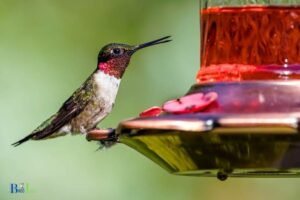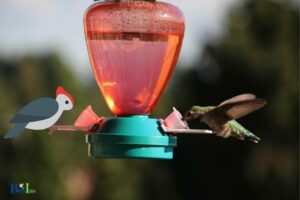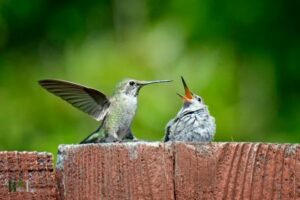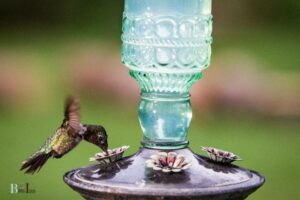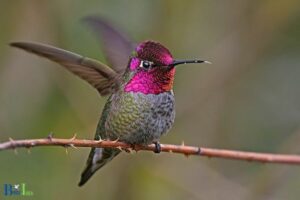What Do Hummingbird Drink: Fruit Juice!
Hummingbirds drink nectar from flowers, as well as sap and fruit juice.
They also consume small insects and spiders to get the necessary nutrients, such as protein and vitamins, required for their survival.
While nectar is their main food source, hummingbirds also eat small insects and spiders to supplement their diet with protein and other nutrients.
Hummingbirds are able to use their long beaks and long tongues to access nectar from deep within a flower.
They use their sense of sight to locate food sources and when they find one, they use their beaks to sip the nectar out and then move quickly on to the next.
Hummingbirds consume the insect source for its much-needed protein and other essential vitamins, minerals and micronutrients.
8 Species About Hummingbirds Drink
| Hummingbird Species | Primary Drink | Additional Information |
| Anna’s Hummingbird | Nectar | Prefers flowering plants like sage and fuchsia |
| Ruby-throated Hummingbird | Nectar | Also feeds on insects and spiders for protein |
| Black-chinned Hummingbird | Nectar | Often found near water bodies for insects and spiders |
| Rufous Hummingbird | Nectar | Has a preference for red or orange flowering plants |
| Calliope Hummingbird | Nectar | May also consume tree sap |
| Broad-tailed Hummingbird | Nectar | Also regularly feed on insects |
| Allen’s Hummingbird | Nectar | Known to eat insects and spiders as well |
| Costa’s Hummingbird | Nectar | May consume tree sap occasionally |
Key Takeaway
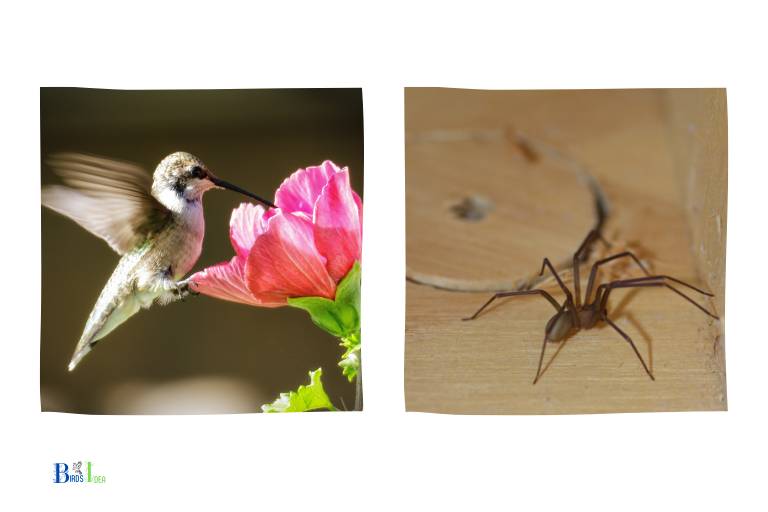
Five Facts About: Hummingbirds Drink
What do Hummingbirds Drink?
Hummingbirds get their energy from nectar and insects which they consume to survive. Nectar is a sweet liquid produced by flowers, which hummingbirds sip through their long, slender beaks.
Hummingbirds also drink water, which they may find in small puddles, birdbaths, or large leaves and stems. They may also consume sap from trees, small fruits, and insects.
Here is a list of food sources hummingbirds can drink:
What Type of Nectar do Hummingbirds Prefer?
Hummingbirds prefer nectar with a 4 to 1 ratio of water to sugar. Generally, shop-bought solutions or home-made mixtures with the same ratio are acceptable for hummingbirds.
Here are 5 types of nectar that hummingbirds generally prefer:
There are many different options when it comes to offering nectar to hummingbirds, providing they contain the same 4:1 ratio of water to sugar.
Nevertheless, always choose the freshest products available when offering the nectar to these birds.
Do Hummingbirds Drink Water?
Yes, hummingbirds do drink water. They can obtain this from several sources, including nectar from flowers, water from puddles and rain, and tiny water droplets on spider webs.
Additionally, hummingbirds may drink from feeders or bird baths. Hummingbirds require a lot of water to stay hydrated, especially when the air temperatures are high.
Without access to adequate water sources, hummingbirds will not be able to survive.
Do Hummingbirds Drink Sap?
No, hummingbirds do not drink sap. They get most of their nutritional needs from the nectar of flowers. They also feed on various types of insects and small invertebrates.
Hummingbirds will sometimes eat tree sap, but only when other food sources are not available.
Do Hummingbirds Drink Fruit Juice?
No, hummingbirds do not drink fruit juice. They mainly rely on flower nectar and insects as sources of food. They only occasionally take small sips from other sources of liquid, like birdbaths.
Some hummingbird feeders also provide an artificial nectar solution for the birds to drink that is made up of a mixture of water and sugar. Therefore, it is not advisable to give hummingbirds any type of fruit juice.
Do Hummingbirds Drink Insects?
No, hummingbirds do not drink Insects. Hummingbirds obtain nourishment from nectar, a sugary liquid made by flowers and derived from insects, such as spiders and flies.
They also feed on flowery material, a carbohydrate-rich diet of small tree parts called “hawkweed.”
The benefits of a hummingbird’s diet include:
What are the Benefits of Hummingbirds Drinking Nectar?
Hummingbirds rely on nectar for energy, and their diet consists entirely of liquid. Nectar provides them with the essential elements they need to survive, including carbohydrates, minerals and vitamins.
Nectar gives hummingbirds the necessary energy boost to fuel their rapid wing beats, which in turn helps them fly long distances.
Furthermore, nectar helps hummingbirds build strong muscles, aiding in long-distance migration.
Some of the benefits of hummingbirds drinking nectar include:
Do Hummingbirds Drink Rainwater?
Yes, hummingbirds do drink rainwater. Hummingbirds are attracted to rainwater because it tends to be cleaner and more accessible than other natural sources.
Hummingbirds typically use their long beaks and tongues to sip rainwater from leaves, branches, and other surfaces.
Rainwater can also provide essential minerals and trace elements that hummingbirds need for important biological processes.
In addition, the area below rainclouds attracts many types of insects, which can provide a food source to hummingbirds.
FAQ OF What Do Hummingbird Drink
What do Hummingbirds drink?
What kind of nectar do hummingbirds prefer?
Is it necessary to feed hummingbirds?
Do hummingbirds need water?
Conclusion
Hummingbirds have a unique way of obtaining the nourishment they need to survive.
They drink the nectar of flowers, eat small insects and spiders, and may also indulge in sap and fruit juices.
Hummingbirds require an array of nutrients and vital vitamins to continue thriving and their long beaks and tongues assist in providing the sustenance they need.

